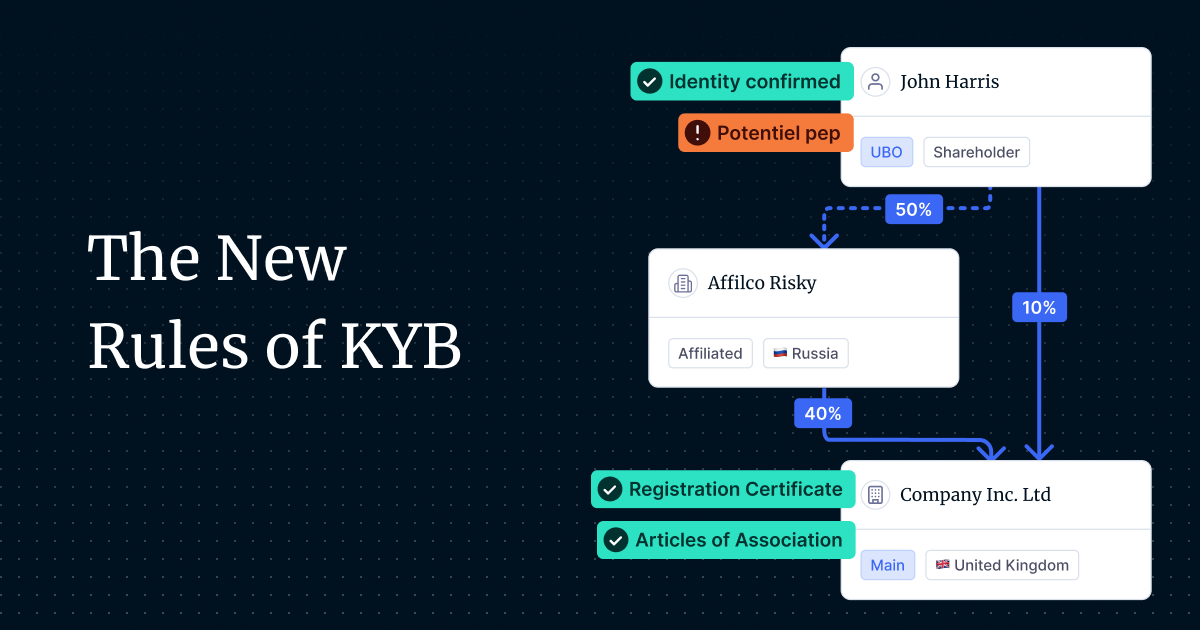What is KYC Verification?
Know Your Customer (KYC) verification has long been fundamental to how financial institutions manage risk. KYC processes focus on gathering and verifying customer data to confirm individual identity, helping assess potential risks associated with each client. This verification is essential for combating money laundering, terrorist financing, and other financial crimes.
KYC typically involves document verification of government-issued IDs like passports or driver's licenses, proof of address validation, and additional personal information collection. Requirements vary based on jurisdiction and business needs, ensuring companies deal with legitimate individuals while maintaining regulatory compliance.
Understanding UBO Verification
Ultimate Beneficial Owner (UBO) verification examines the ownership structure of companies more deeply. A UBO refers to individuals who ultimately own or control a business, either directly or indirectly. The primary goal of UBO verification is to identify the true owners behind corporate entities, adding crucial transparency and risk mitigation layers.
Unlike standard KYC processes that collect basic customer information, UBO verification goes further by identifying individuals with significant control, even when they're not listed as legal owners. This becomes critical when complex ownership structures, trusts, or nominee arrangements might conceal true beneficiaries.
Key Differences Between KYC and UBO Verification
Information Scope and Requirements
Both KYC and UBO verification aim to verify specific information sets. While some data, like names or addresses, appear in both processes, each has unique requirements. KYC primarily focuses on individual customer identity verification, ensuring baseline legal compliance. UBO verification is more comprehensive, dealing with business ownership and control structures to unveil actual decision-makers.
Primary Purpose and Application
KYC serves as a broad customer identification process for assessing individual risk profiles, helping businesses comply with AML and counter-terrorism financing regulations. UBO verification, though superficially similar, focuses specifically on business owners and controllers, addressing corporate transparency concerns and potential misuse of complex structures.
Handling Complex Corporate Structures
KYC processes may not reveal intricate ownership layers, especially involving holding companies, subsidiaries, or trusts. Standard KYC rarely provides ownership-related information. UBO verification is specifically designed to navigate complex ownership webs, ensuring a thorough understanding of business ownership dynamics beyond the KYC scope.
Regulatory Compliance Requirements
While KYC represents mandatory requirements for various regulatory compliance frameworks, UBO verification complements these processes by addressing specific mandates related to corporate transparency and beneficial ownership disclosure requirements.
How Dotfile Streamlines Verification Processes
Dotfile provides an end-to-end business verification platform that streamlines both KYB and AML processes. Our innovative features allow businesses to instantly perform due diligence, risk assessment, and re-verification procedures. Improve internal operations by automating KYB and UBO verification while reducing repetitive manual reviews. Create smooth onboarding experiences with our white-label solution, accelerate account opening, and ensure regulatory compliance globally.
Choosing Between KYC and UBO Verification
Despite similarities, KYC and UBO verification serve distinct purposes. KYC targets individual clients who don't represent business entities, such as individuals applying for personal bank accounts. UBO verification includes some KYC steps but requires additional procedures for identifying and verifying ownership structures. Each process has specific goals and helps achieve relevant regulatory compliance. Required steps and checks often depend on jurisdiction and business needs. Companies seeking verification solutions should understand the capability scope and compliance contributions.
![KYC vs UBO Verification: Which Do You Need? [2025 Guide]](https://cdn.prod.website-files.com/65d0aabb19a348bcfb3c60e7/65d492f1263729bacfeb09ce_65b39a617dda1d30161b6492_KYC%2520vs%2520UBO%2520-%2520identifying%2520individuals.jpeg)




.png)
